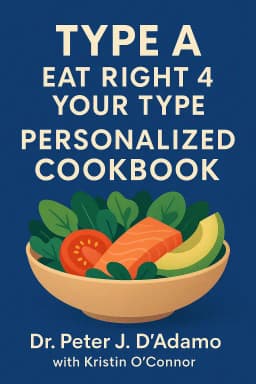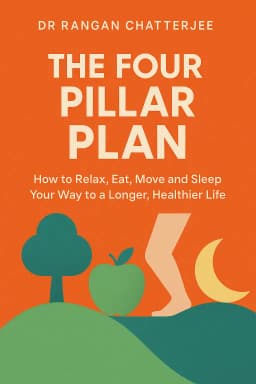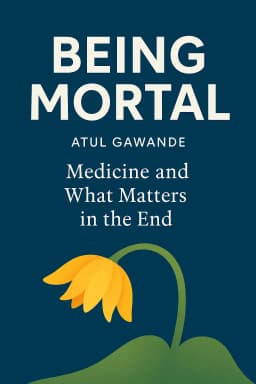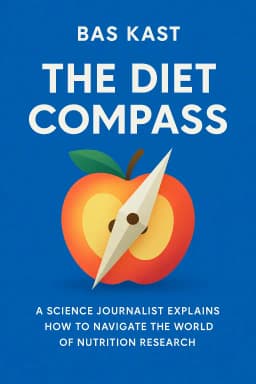
The Longevity Playbook: A Leader's Guide to Mastering Healthspan
Golden Hook & Introduction
SECTION
Orion: Angela, imagine you're the CEO of a billion-dollar company. You'd never wait for it to be on the verge of bankruptcy before you took action. You’d have a long-term strategy. Yet, when it comes to our most valuable asset—our health—most of us are stuck in crisis-management mode. We wait for the diagnosis, for the fall, for the disease. Peter Attia’s groundbreaking book,, argues this is a fundamentally flawed approach.
Angela : That's a powerful way to put it, Orion. It immediately clicks. In business, you're always looking at leading indicators, not lagging ones. A bad quarterly report is a lagging indicator. High customer churn is a leading indicator you need to act on. It sounds like Attia is applying that same strategic foresight to our biology.
Orion: That is the perfect analogy. And today, we're going to unpack his playbook for becoming the CEO of your own health from three perspectives. First, we'll explore the revolutionary mindset shift to 'Medicine 3.0.' Then, we'll discuss how to set your ultimate long-term goal with the 'Centenarian Decathlon.' And finally, we'll focus on the tactical tools, like personalized nutrition and technology, that can get you there.
Angela : I'm ready. It feels like we're about to draft a new kind of business plan—one for a longer, healthier life.
Deep Dive into Core Topic 1: Medicine 3.0: The CEO Mindset for Health
SECTION
Orion: Let's start with that mindset shift. Attia illustrates the problem with our current system, which he calls Medicine 2.0, through a powerful recurring dream he had as a surgical resident at Johns Hopkins.
Angela : A dream? That's an unusual place for a medical thesis to start.
Orion: It is, but it's incredibly vivid. He dreamt he was in a big, dirty city, and eggs were falling from the top of a tall building. His job was to run around with a padded basket and catch them before they splattered on the pavement. He gets better and better at it, catching more and more eggs, but he can never catch them all. The eggs just keep falling, and he wakes up exhausted and frustrated.
Angela : Wow. And the eggs are... patients?
Orion: Exactly. Specifically, they were his pancreatic cancer patients. He was training to perform the Whipple procedure, an incredibly complex surgery. He and his colleagues were getting technically brilliant at it—they were getting 'pretty good at catching the eggs.' But the brutal reality was that nearly all these patients would still die within a few years. The egg would inevitably hit the ground. He was just delaying the inevitable.
Angela : That's such a powerful metaphor. It's the classic distinction between being busy and being effective. The surgeon is incredibly skilled, but their entire effort is reactive. A true leader, or a strategist, would be focused on the root cause upstream. They wouldn't be content just catching eggs; they'd be asking, "Who is on top of that building, and how do we stop them?"
Orion: You've just defined Medicine 3.0. That's the epiphany Attia had. Instead of perfecting the art of reacting to late-stage disease, we need to get to the top of the building. We need to be proactive, not reactive. It's not about waiting for the diagnosis; it's about preventing the conditions that lead to it in the first place.
Angela : So it's about shifting the timeline. Instead of a 10-year risk assessment, which seems to be the standard for things like heart disease, you're looking at a lifetime risk. That feels like a financial investment strategy—you don't just plan for next year's budget; you plan for retirement decades away.
Orion: Precisely. The goal isn't just a longer lifespan, but a longer. Healthspan is the period of your life where you are free from disease and disability. Attia wants us to avoid what he calls the 'Marginal Decade'—those last ten years of life so many people spend in physical, cognitive, and emotional decline.
Angela : And the alternative?
Orion: The alternative is to create a 'Bonus Decade.' Or two, or three. A period where you are not just alive, but thriving, engaged, and capable. And that requires a strategy, not just a series of reactions.
Deep Dive into Core Topic 2: The Centenarian Decathlon: Your Ultimate Long-Term Goal
SECTION
Orion: And if your objective is to thrive in that 'Bonus Decade,' you need a concrete strategy. This brings us to my favorite concept in the book: The Centenarian Decathlon.
Angela : A decathlon for 100-year-olds? I'm intrigued. That sounds ambitious.
Orion: It is! But the training starts now. The idea is this: instead of vague goals like 'get fit,' you reverse-engineer your fitness from the future. You sit down and define 10 to 15 physical tasks you want to be able to do with ease in your ninth or tenth decade.
Angela : So you're creating a list of personal 'events.'
Orion: Exactly. Maybe one event is lifting a 30-pound grandchild. Another is carrying two bags of groceries up a flight of stairs. A third could be getting up off the floor using only one hand for support. Or hiking a favorite trail. These become your North Star. You then work backwards and figure out the strength, stability, and aerobic fitness you need to be able to do those things with confidence when you're 95.
Angela : I love that. It's so tangible. As someone who admires athletes like Serena Williams, this frames aging as an athletic event you're actively training for. It's not about inevitable decline; it's about performance. What would be on your list, Orion?
Orion: For me, definitely being able to hike a 3-mile trail with a bit of elevation. And getting up off the floor with one hand is a big one. What about you, Angela? What's a potential 'event' in your decathlon?
Angela : Hmm, that's a great question. I think being able to put my own carry-on luggage in the overhead bin is a big one for independence. And maybe being able to play a game of tag with my future great-grandchildren. It completely reframes the purpose of exercise from something you 'should' do to something with a very clear, very personal 'why.'
Orion: It does! It gives it purpose. Attia uses the story of Muhammad Ali in the 1974 'Rumble in the Jungle' fight to show the power of strategy. Ali was older and weaker than George Foreman. He knew he couldn't out-punch him. So his strategy wasn't to fight harder; it was to wear Foreman out. The famous 'rope-a-dope' was just a tactic to serve that strategy.
Angela : So, the Centenarian Decathlon is our strategy. The specific exercises we do—the weightlifting, the cardio—those are the tactics.
Orion: You got it. The strategy dictates the tactics. And that clarity is what makes it so powerful.
Deep Dive into Core Topic 3: Nutrition 3.0: Your Personal Health Dashboard
SECTION
Orion: So, if the Centenarian Decathlon is our strategy, let's talk about the tactics, specifically in an area you're passionate about: nutrition and technology.
Angela : This is where it gets really interesting for me. It's one thing to have a goal, but you need data to know if your tactics are working.
Orion: Exactly. And this is where Attia introduces 'Nutrition 3.0.' He argues we should stop talking about 'diets'—a word loaded with emotion and dogma—and start thinking about 'nutritional biochemistry.' It's not about labels like 'vegan' or 'keto'; it's about understanding how specific food molecules—glucose, fructose, protein—interact with unique body.
Angela : And to do that, you need feedback. This is where the tech piece gets really exciting. You're talking about tools like Continuous Glucose Monitors, or CGMs.
Orion: Precisely. For a long time, these were only for people with diabetes. Now, they're becoming accessible to anyone. A CGM is a small sensor you wear that gives you a 24/7 readout of your blood glucose levels on your phone. It's a game-changer.
Angela : It’s like having a stock ticker for your metabolism. You get immediate feedback on your dietary 'investments.'
Orion: That's a fantastic way to put it. Attia tells a story about a patient, Eduardo, a construction worker who drank a lot of sugary sports drinks. His blood sugar was out of control, and he had full-blown type 2 diabetes. The fix was simple: cut out the sugar and refined carbs. But for most of us, the effects are more subtle. A CGM can show you, in real-time, how a bowl of 'healthy' oatmeal might be spiking your glucose, while a breakfast of scrambled eggs and avocado keeps it stable and low.
Angela : That's actionable intelligence. It moves you from following generic rules—'eat whole grains'—to making personalized decisions. You might discover that for, a banana is fine, but a bowl of rice sends your blood sugar soaring. That's the kind of data any leader would want before making a critical decision.
Orion: It's the ultimate personalization. You're not following a guru or a diet book; you're responding to your own body's data. That's the core of Medicine 3.0—it's about empowering the individual with information to become the true expert on their own health.
Synthesis & Takeaways
SECTION
Orion: So, to bring it all together, the playbook from gives us three powerful tools. First, a new mindset: Medicine 3.0, which means we stop being passive patients and start acting like the CEO of our own health.
Angela : Second, a long-term strategy: the Centenarian Decathlon. It gives our daily efforts a clear and inspiring purpose, turning the abstract goal of 'longevity' into a concrete set of performance targets.
Orion: And third, personalized tactics. We can use technology like CGMs to practice nutritional biochemistry, creating a health dashboard that allows us to make data-driven decisions tailored to our own bodies.
Angela : It's a powerful framework. It makes longevity feel less like a passive hope and more like an active, engaging project. So, for everyone listening, the question isn't just 'how do I get healthier?' It's 'What is the first event in your personal Centenarian Decathlon, and what's one small thing you can do to start training for it this week?'









